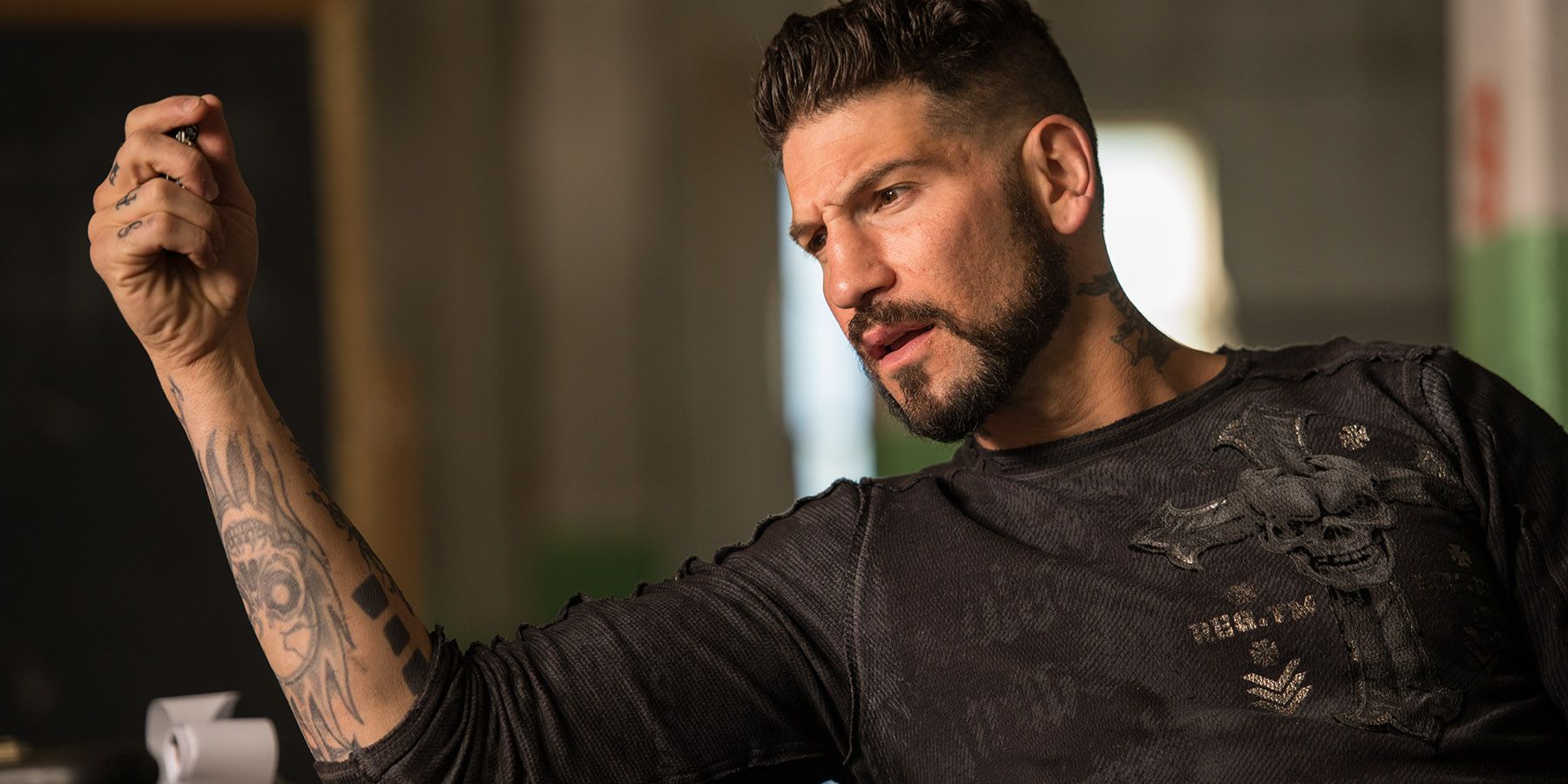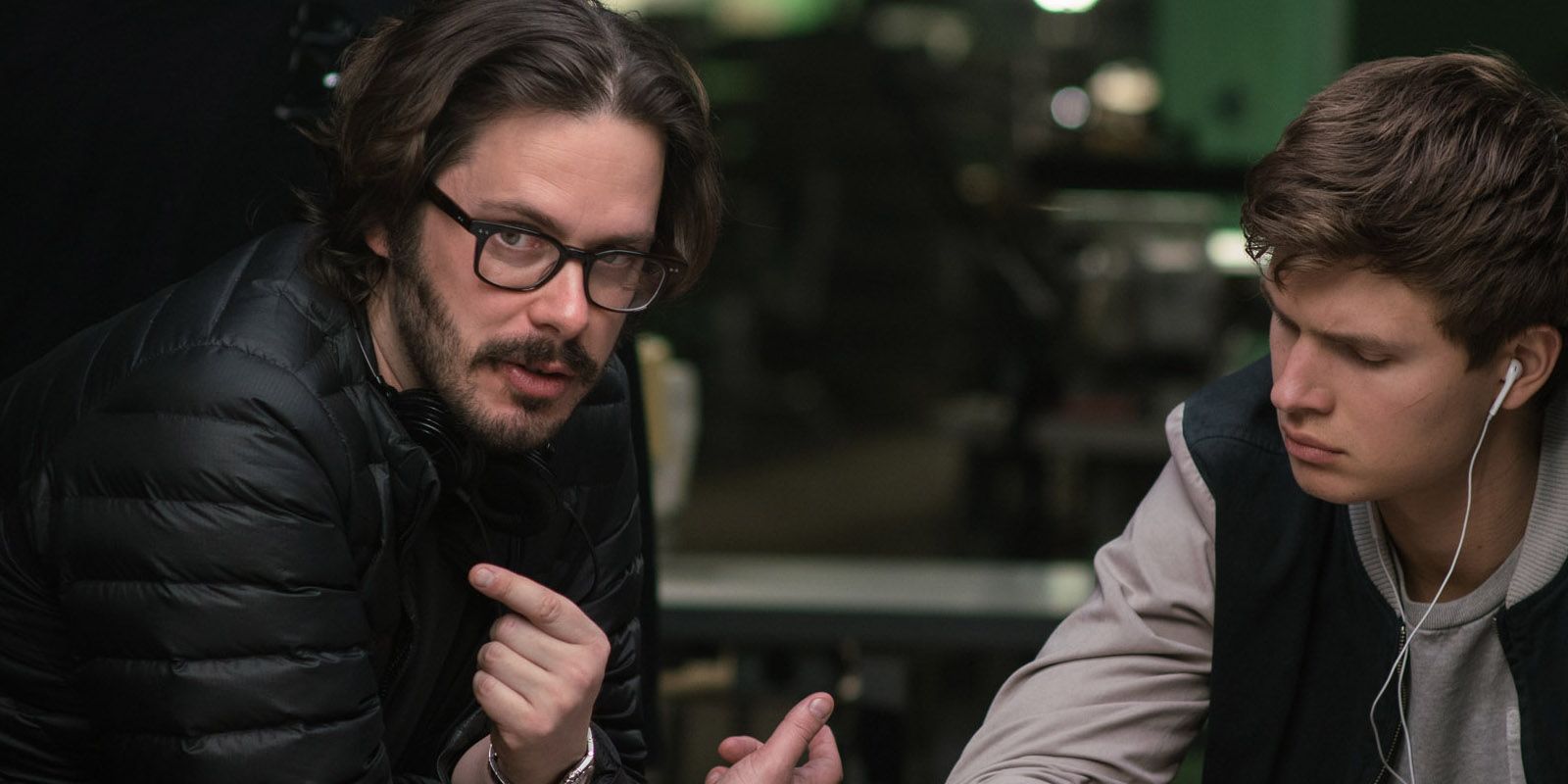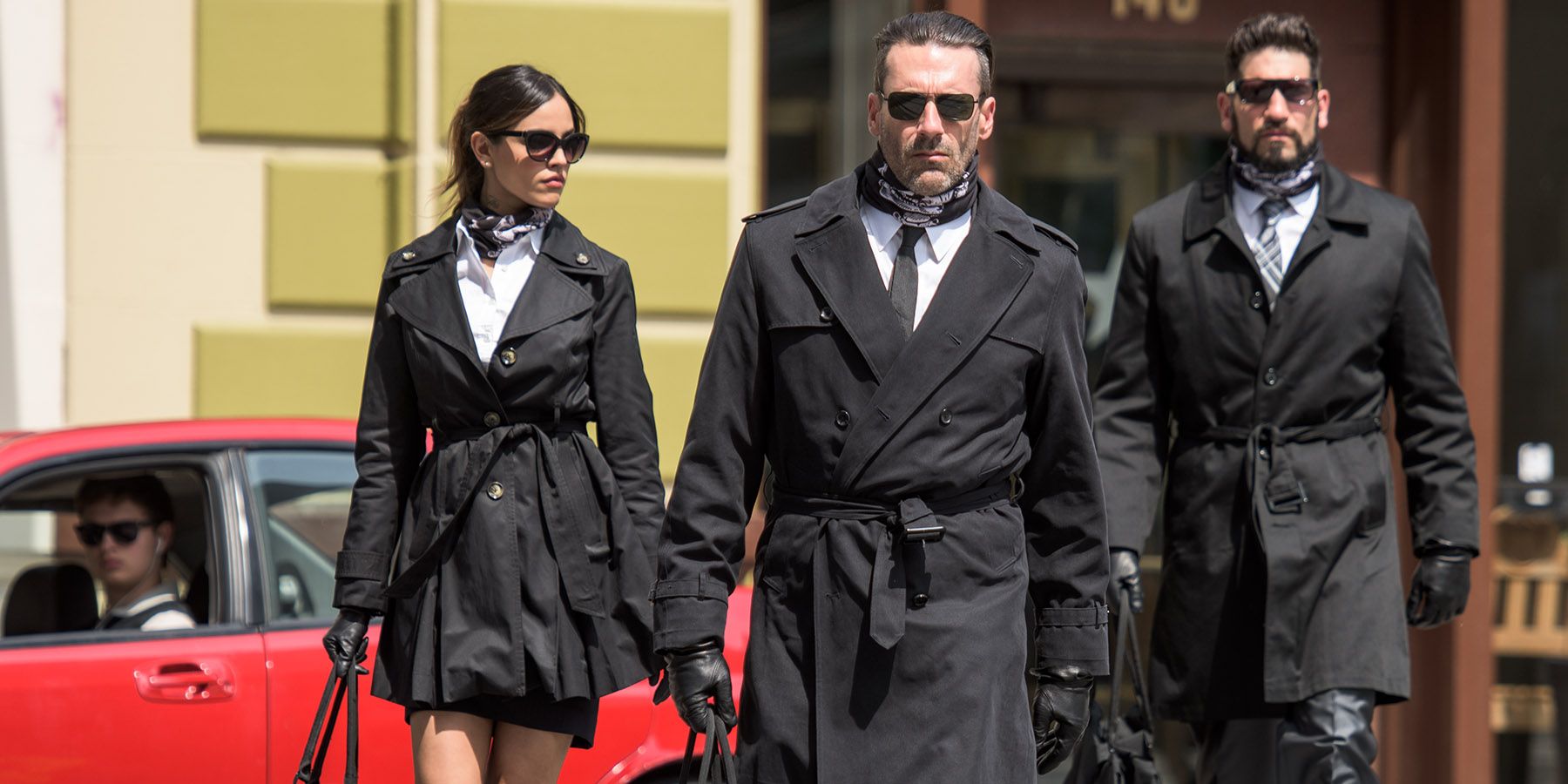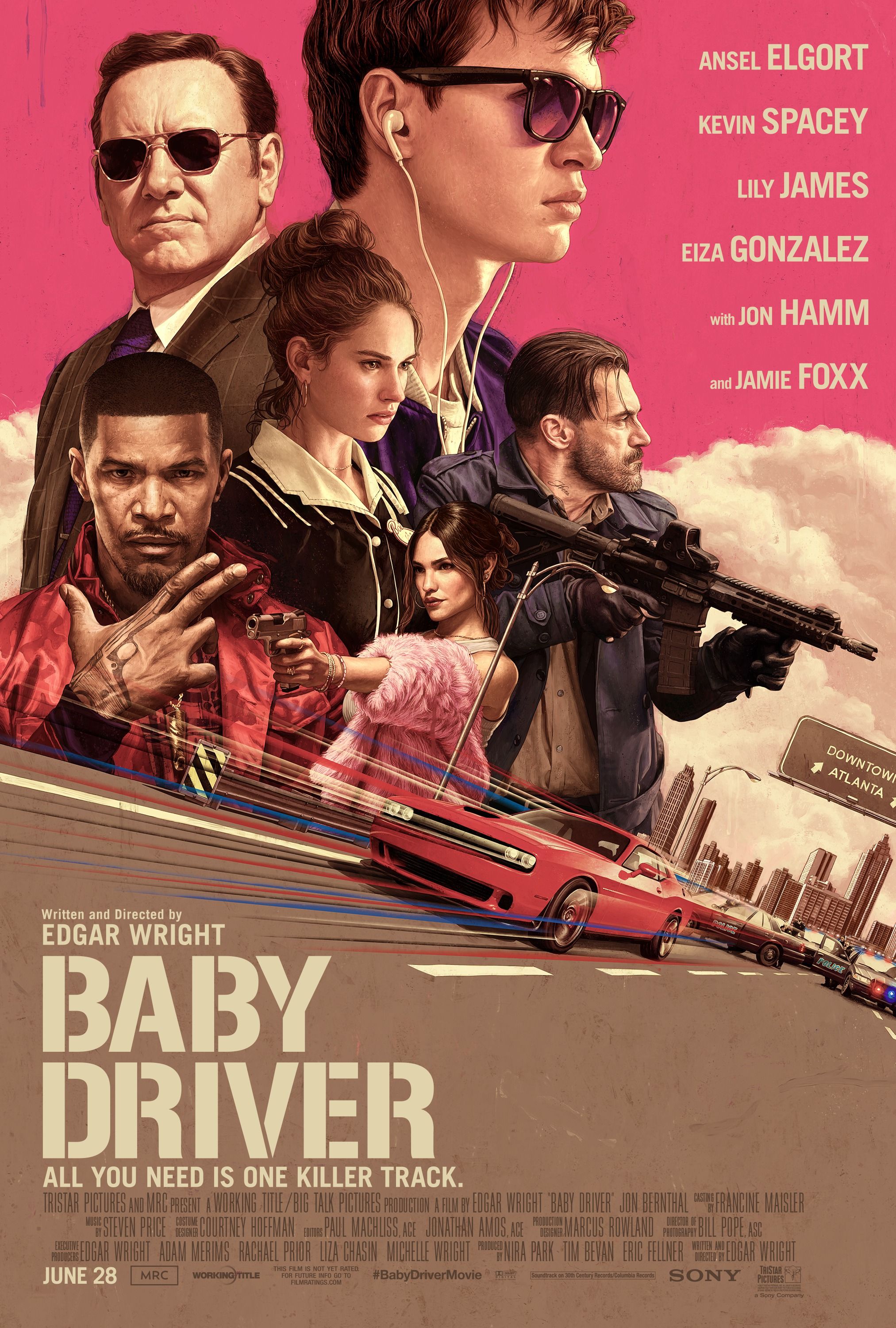In April 2016 we visited the Atlanta production of Edgar Wright's Baby Driver and one of our first interviews of the day was with Jon Bernthal who has a neat supporting role in the stylish car action flick. Bernthal plays Griff, the muscle of one of the heist teams featured in Baby Driver.
You may have seen Bernthal in HBO's The Pacific way back when, and maybe he became the star he is now in the early days of The Walking Dead, but now Bernthal is everywhere, including on Netflix as a scene-stealer in season 2 of Daredevil where he play's Frank Castle a.k.a. Marvel's Punisher who's getting his own series later this year. In our conversation, that comes up briefly, as we discuss working with Edgar Wright, and getting in on the practical effects and stunts... maybe a little too much.
So what can you tell us about Griff? We don't really know anything about this character.
Jon Bernthal: Um... not much, not much. I don't know, I feel like I'm living in a world of secrets now, 'cause I've just been doing all this Marvel press. Yeah, man, look, he's part of the crew, he's part of the heist crew. He is sort of a reluctant witness to Baby's unbelievable driving skills. I think he's a little bit of a heavy. I think he's got some real doubts about this fresh-faced youngster who's got so much responsibility on his hands, and I think that'll play out as we play more of it.
I see the teardrop tattoo.
Jon Bernthal: Uh huh, uh huh.
So we know what that means.
Jon Bernthal: Do you know what that means? What does that mean?
You killed somebody.
Jon Bernthal: I don't know.
[Laughes] Can you tell us about the other tattoos on your neck?
Jon Bernthal: You know, they're also on my hands and stuff. Today I'm wearing gloves, so we don't have to go through it. But I think there's some allusion to him spending some time in prison, stuff like that.
Related: Jon Bernthal Explains What Makes Edgar Wright A Unique Director
A lot of characters are defined by a certain color scheme, right? So I'm assuming gray is your thing?
Jon Bernthal: Yeah, this is the outfit for the first bank heist. Which I guess that the idea is to go in in suits to blend in, you know what I mean, with masks and then running shoes so we can get away.
What are some of the other outfits you get to wear during the film?
Jon Bernthal: Right after this first heist, there's a scene where we get into our everyday clothes. And I think with me and the designer, the way she looked at it is, you go from like douchey to more douchey. [Journalists laugh] I think my dress is pretty douchey, that's my style. I'm a pretty douchey guy. She always reminds me of that. Griff, not Jon!
Can you talk about working with Edgar? How have you found the collaborative process?
Jon Bernthal: Look, I mean, obviously, that's why you sign on to something like this, to work with someone like that. He's a visionary. Every director, every job is different. I think with this particular project, it's so specific, this movie already existed in Edgar's mind before. You know, sometimes you get called into something and even with the great directors, it's kind of like, you all get there and you play and you sort of figure it out, what it is. I think he's different. I think these films exist in his mind before you get there. You know, not to take the onus off myself or the other performers, I can only speak for myself, but it kind of takes all pressure off of you, you sort of just show up and be an uber marionette for what he wants. Since so much of this movie is set to music, it's really about fitting in in the strict choreography. I think there's a freedom in limits. But think, like I said, the movie exists in his mind, and it's sort of, you know, when he says jump, ask him how high once you're already in the air. It's a long-ass answer to a short-ass question.
[Laughs] How challenging has that been for you, to stay on beat and always do everything in cue to the music?
Jon Bernthal: It's cool. Look, man, full disclosure, this isn't a huge -- for me, I'm not here that much, you know what I'm saying? I don't think he's asking anybody to be a dancer. We're not shooting a music video. I think like I said before, you know, it might feel restricting to, "okay, we've gotta shoot this scene and it's gotta all fit in both rhythmically and in terms of how long it is in the time of a certain song" -- there's a freedom in that. There's a freedom to play. And there's a freedom, I think, to explore a little bit, because it is in fact set to music. I haven't been asked to pull any crazy dance moves, it's not like that at all, but it's defined character moments, within the music. And like I said, a lot of times, I mean, if you look through the history, not to act like a artsy-fartsy douche, but you look in the history of art, technique, and limitations like that can also provide opportunity for great freedom.
Where would you say Griff fits in in this crew? We know Baby is sort of the getaway guy, what about Griff? Is he the muscle, the crowd control?
Jon Bernthal: Yeah, I think he's more of the muscle. He's sort of like the last guy you want, but you're glad that he's on your team, not on the others', you know what I mean? I think in this situation, I think the idea behind him is, he's kind of the guy who's good to have in a pinch, but like, man he can be annoying, you know what I mean? I think he's loud and brash and he does not keep his opinions to himself.
Is there one specific character you come into have discussions with most, like exchanges?
Jon Bernthal: You know, it's really a group. But I think he very early on keys in on Baby, and I think there's something that just doesn't make sense, like, "This guy doesn't fit in with the rest of us," yeah.
We've heard there's another team of stuntmen who are like crashing the cars, chasing up other people, are there any stunts that you yourself are able to do?
Jon Bernthal: Yeah, I mean, I don't think they care much about me around here. [Journalists laugh] They sort of like throw me into the car. I've noticed a few times it's been me and all stunt guys in the car, and I'm like, 'all right,' you know what I mean? And I have a double, too, and I'm just like, 'You know, he could--' But it's great fun, the car stuff, flying around in the cars. Throughout my career, being able to get close with the stunt community and seeing how talented these artists are and how they keep on getting better and better each year and challenging themselves to go further and further, I just think it's sort of the most unsung talent of the business. I think they deserve so much more praise than they get, what these guys are able to do with automobiles, with fighting, with weapons. I mean, it's incredible, and I've been blessed to get to know so many of them so well. But I've never really worked this way with stunt drivers, and man oh man, to be able to do what they do and to do it safely, and the choreography that takes. You're really playing with life and death there, and they are phenomenal.
Does it take a lot of convincing when they say, 'Oh, go get in the car'?
Jon Bernthal: Nah, no, no, I mean, it's crazy about cameras. I was an athlete and I was a boxer and I'll do certain things but I'm full of fears, just like anyone else. I've got kids, I want to go home. But there's something, for me, when someone points a camera at me, I just so believe in the crew and everyone. There's literally nothing I wouldn't do if you told me to jump off this building, "You gonna be all right," there's so much trust in the film crew, and I believe in that wholeheartedly. And that camera, it gives you big giant balls, you know what I'm saying? Excuse my expression here.
Related: Jon Bernthal Reveals The Punisher ‘Resonates’ with Him
We talked a lot about how this film is mostly practical, not a lot of special visual effects, and you work on a lot of projects where it's been very practical. From an actor's perspective, what does it add?
Jon Bernthal: Way better. Way better. Yeah. I mean, look, not to take away from digital effects artists, because they're artists in their own right, but to me, there's practical, it's practical, practical, practical, it's right there, you can touch it, you can see it, you can react off of it. You know, I always not only prefer that, but I think actors, your greatest tool is your imagination. So there's a lot of stuff you can do with greenscreen and all that, but you know, when there's real blood to feel and play with and play off of and you're really seeing what's going on and you can touch it and feel it, I think it just provides so much more opportunity to explore, to create.
What's it been like working with Edgar, what have you noticed that's different about working with him as opposed to the other directors you've worked with?
Jon Bernthal: Every director's so different, and I think what's uniform among all the great ones that I've gotten to work with is passion. And, you know, the sense that you're going to be all right, you're in good hands. So you're not gonna leave the set until you've got something, until you've got something special. So that's good. I mean, I think the big fear, especially, coming from TV, is that you're going to walk away with that attitude of like, "Okay, yeah, we're going to be all right," like, "Okay, that'll do," you know, and "that'll do" just doesn't really do with me. I don't like that. I need to know that it's not going to be two or three takes, that we are literally going to sit here until my man is happy. And if my man is happy, that's why we're here, right? So I've noticed that with him. He doesn't always let you know when he's happy, you know? He's not one of those guys, he's not a big rah-rah guy. Another thing that I feel like that's really uniform, and I've never seen with anybody except for Polanski and him, is that he's always there. He's always there. He's always on set. He's always the first guy there and the last guy to leave and he's always there, second unit, he's always there, when everybody else is sleeping, he's there, and he's never just sitting around and enjoying set life. He's working, working, working, always, and I love that, I respect that.
Speaking of reshooting the scenes multiple times, can you talk about that experience going to like the stunts? Compared to previous stunt work that you've done, what's it been like doing some of these more dynamic car scenes?
Jon Bernthal: I mean, we're still in it. I think because so much of the car stuff we have to close down roads, we shoot it on weekends, so we'll shot a teeny little bit one week and then we'll come back a couple weekends later and that's what we're about to get to this weekend. I mean, I get it, it's a process, and you know, again, those decisions are made in rooms I'm not invited into, you know, it's a little above my pay grade. So you just have to know at the end you're making something special, and it's going to take going back and back and back to get it right, and that's part of the deal.
More: Edgar Wright Explains Baby Driver’s Origins
A talented, young getaway driver (Ansel Elgort) relies on the beat of his personal soundtrack to be the best in the game. When he meets the girl of his dreams (Lily James), Baby sees a chance to ditch his criminal life and make a clean getaway. But after being coerced into working for a crime boss (Kevin Spacey), he must face the music when a doomed heist threatens his life, love and freedom.




